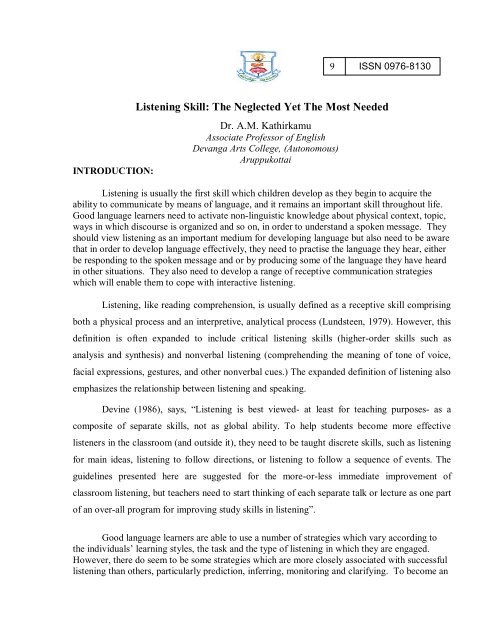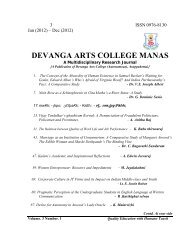A Multidisciplinary Research Journal - Devanga Arts College
A Multidisciplinary Research Journal - Devanga Arts College
A Multidisciplinary Research Journal - Devanga Arts College
You also want an ePaper? Increase the reach of your titles
YUMPU automatically turns print PDFs into web optimized ePapers that Google loves.
INTRODUCTION:<br />
Listening Skill: The Neglected Yet The Most Needed<br />
Dr. A.M. Kathirkamu<br />
Associate Professor of English<br />
<strong>Devanga</strong> <strong>Arts</strong> <strong>College</strong>, (Autonomous)<br />
Aruppukottai<br />
Listening is usually the first skill which children develop as they begin to acquire the<br />
ability to communicate by means of language, and it remains an important skill throughout life.<br />
Good language learners need to activate non-linguistic knowledge about physical context, topic,<br />
ways in which discourse is organized and so on, in order to understand a spoken message. They<br />
should view listening as an important medium for developing language but also need to be aware<br />
that in order to develop language effectively, they need to practise the language they hear, either<br />
be responding to the spoken message and or by producing some of the language they have heard<br />
in other situations. They also need to develop a range of receptive communication strategies<br />
which will enable them to cope with interactive listening.<br />
Listening, like reading comprehension, is usually defined as a receptive skill comprising<br />
both a physical process and an interpretive, analytical process (Lundsteen, 1979). However, this<br />
definition is often expanded to include critical listening skills (higher-order skills such as<br />
analysis and synthesis) and nonverbal listening (comprehending the meaning of tone of voice,<br />
facial expressions, gestures, and other nonverbal cues.) The expanded definition of listening also<br />
emphasizes the relationship between listening and speaking.<br />
Devine (1986), says, “Listening is best viewed- at least for teaching purposes- as a<br />
composite of separate skills, not as global ability. To help students become more effective<br />
listeners in the classroom (and outside it), they need to be taught discrete skills, such as listening<br />
for main ideas, listening to follow directions, or listening to follow a sequence of events. The<br />
guidelines presented here are suggested for the more-or-less immediate improvement of<br />
classroom listening, but teachers need to start thinking of each separate talk or lecture as one part<br />
of an over-all program for improving study skills in listening”.<br />
9 ISSN 0976-8130<br />
Good language learners are able to use a number of strategies which vary according to<br />
the individuals’ learning styles, the task and the type of listening in which they are engaged.<br />
However, there do seem to be some strategies which are more closely associated with successful<br />
listening than others, particularly prediction, inferring, monitoring and clarifying. To become an



